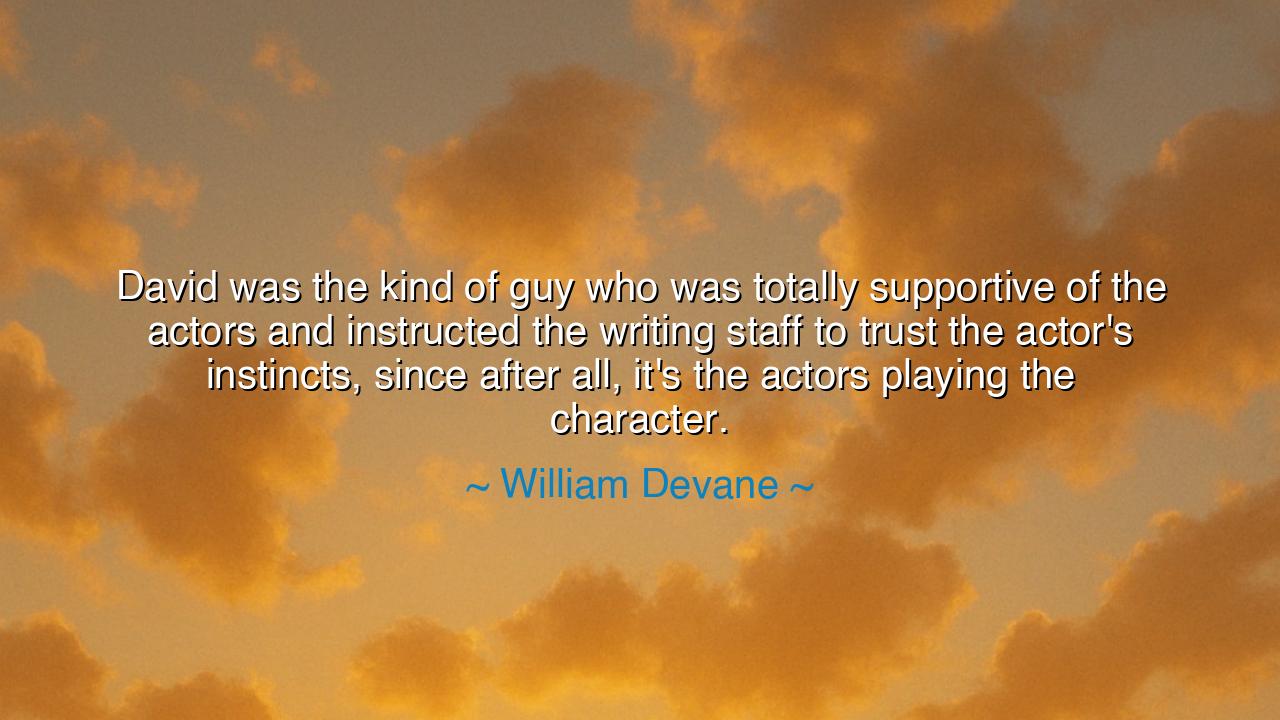
David was the kind of guy who was totally supportive of the
David was the kind of guy who was totally supportive of the actors and instructed the writing staff to trust the actor's instincts, since after all, it's the actors playing the character.






Hear the words of William Devane, who spoke not merely of a man, but of a principle that touches the essence of art itself: “David was the kind of guy who was totally supportive of the actors and instructed the writing staff to trust the actor’s instincts, since after all, it’s the actors playing the character.” These lines, though rooted in the craft of storytelling, echo a wisdom far greater than stage or screen. They speak of respect, of collaboration, of the recognition that truth emerges not from control, but from trust.
For in the world of creation, the actor is not merely a vessel repeating lines written on a page. The actor is the living breath of the story, the embodiment of the dream. Words on paper are the seed, but it is the actor’s soul that allows the seed to sprout, to grow, to bear fruit in the eyes of the audience. To trust the instincts of the actor is to admit that art is not a monologue but a dialogue, not a command but a communion between writer, actor, and viewer.
This truth is ancient. In the theaters of Greece, the playwright Aeschylus set down mighty lines, but it was the actor, masked and robed, who gave those lines fire. The playwright may have drawn the outlines of Agamemnon, but it was the actor who gave him voice, who made the people weep or rage. Likewise, in Shakespeare’s time, the Bard himself wrote the words, but it was Burbage and his fellow actors who filled those words with blood and breath. Without instincts, the greatest verse remains ink and silence.
History gives us further witness. Consider Marlon Brando, who transformed the art of performance by leaning into his own instincts. Writers gave him lines, directors gave him guidance, but Brando brought to each role a spontaneity, a humanity that could not have been dictated by another. It was this trust in his own truth that made him unforgettable, and those directors and writers who supported his freedom created art that endures even now.
The lesson here is not confined to the stage. In every field of life, we must learn to recognize the value of another’s instincts, especially when they stand at the heart of the work. A general must trust his soldiers on the field, for they see realities the maps cannot show. A teacher must trust the curiosity of her students, for it is their questions that lead to discovery. A leader must trust the gifts of his people, for each soul holds wisdom the leader cannot possess alone. To trust is not to surrender authority, but to multiply strength.
O seekers, remember this: greatness is not achieved by clinging to control, but by creating space for others to bring their gifts. Just as the actor embodies the character with flesh and spirit, so too in life do others carry pieces of the vision you cannot bear alone. To refuse their instincts is to silence half the truth; to trust them is to create something larger than yourself.
Practical is this wisdom: in your work, in your family, in your art, listen. Encourage others to bring forth what lies within them. Do not bind them with rigid expectations, but allow space for instinct, for improvisation, for the unexpected spark. You may be the writer of a plan, but they are the actors who bring it to life. Trust them, and together you will create something greater than either could alone.
Thus, William Devane’s words endure as a testimony to collaboration. David’s greatness was not merely in his leadership, but in his humility, in his willingness to trust the actors’ instincts and honor their role in the act of creation. And so it is in life: the character is not complete until it is lived. Trust others, and the story you write together will echo across time.






TVTruong Vu
The idea of trusting an actor’s instincts is an interesting approach to creative collaboration. It’s a reminder of how important it is for actors to feel empowered in their roles. But how do writers and directors ensure that this freedom doesn’t compromise the overall story? Can an actor’s interpretation be too far removed from the original vision, or is there always room for flexibility in the creative process?
UGUser Google
This quote makes me think about the dynamic between actors and writers. Trusting an actor’s instincts seems like a powerful way to bring authenticity to a character, but how does it influence the writing process? Does it require flexibility on the part of the writer? And when the actor brings something unexpected to the character, how do the writers and directors respond? How do they ensure the character still fits into the overall story arc?
TDHa Ngoc Thuy Duong
I love the idea that David trusted the actors' instincts, recognizing that they are the ones physically embodying the characters. But how does this impact the writing process? Can actors sometimes push the boundaries of what was originally written, and should they? What happens when an actor's interpretation conflicts with the vision of the writer or director? Is there a point where trust in an actor’s instincts can be too much?
TBTram Bui
William Devane’s reflection on David’s approach to working with actors highlights an interesting balance between trust and collaboration. It’s powerful to think that David valued the actor's instincts in shaping a character. But does this mean the actor has more creative freedom than the writer or director? How do writers balance staying true to the character’s original concept while allowing actors the space to bring their own interpretation to the role?